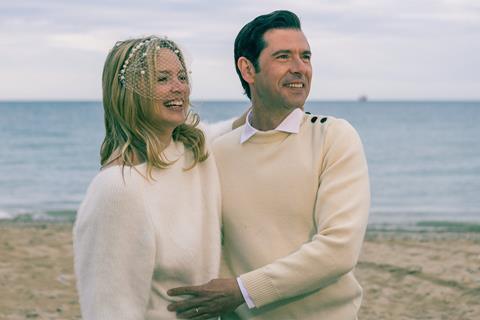French filmmaker Valérie Donzelli discusses the transition of toxic-marriage drama Just The Two Of Us from script to screen

Based on Eric Reinhardt’s bestselling 2014 French novel of the same name, Just The Two Of Us (L’Amour Et Les Forêts) stars Virginie Efira as a woman who must find her way out of a toxic relationship with a deeply possessive man, played by Melvil Poupaud.
Valérie Donzelli joined Happening writer/director Audrey Diwan to co-write the feature adaptation, produced by her longtime producers Alice Girard and Edouard Weil of Rectangle Productions. Goodfellas handles international sales.
Donzelli has run the gamut in Cannes, from opening Critics’ Week with her personal story of a young couple’s battle to save their son in Declaration Of War in 2011 — which opened to strong reviews — to a less enthusiastic reaction to 15th-century France tale of incest Marguerite & Julien in 2015.
What made you want to turn this book into a film?
I read it when it first came out, while filming Marguerite & Julien. It’s an incredible book, a real pageturner. I related to the main character, to her idealism, to the way she makes compromises to please others. She’s in a situation of domination where she feels like she is being crushed — I didn’t have that exact experience, but still the story resonated with me on a personal level. I found the fact that the husband could twist things around to play the victim when he was, in fact, the aggressor was fascinating from a dramatic perspective. I said, “When I grow up, I’ll adapt it to cinema.”
It’s a very difficult book to adapt, and each time I crossed paths with Eric he would tell me the rights were being bounced around. Finally I said, “I’ll do it, I know how to adapt it.”
Did he work with you to bring it to the screen or did he hand you his baby and give you free reign?
He gave me his baby. He said, “I want you to make a great movie, but for that to happen, I can’t be there with you.” In the book, the woman is confiding in the author — and so I replaced the writer with a lawyer. I wanted there to be this question of confidence, of the woman confiding in someone else.
How did the collaboration with Audrey Diwan come about?
I thought she would be the ideal person to write with me. We’d talk about the book and had the same point of view. I said, “If I adapt it one day, I’ll do it with you.” I’d send her what I wrote and we ping-ponged back and forth, and structured it together.
Did you always have Virginie Efira and Melvil Poupaud in mind for the leading roles?
I wouldn’t have made the film if Virginie didn’t want to do it with me. I had played her best friend in [Antoine Barraud’s 2021 film Madeleine Collins] and I saw how prodigious she was. We had a coffee and I gave her the book. A few days later, France went into full lockdown during Covid and from then on, I wrote with her face in my mind. Melvil was an obvious choice to act alongside her. He’s the opposite of what we would imagine as Machiavellian. He started as a child actor so we’ve all grown up with him in French cinema, almost as if we had known him when we were kids like [Efira’s character] Blanche.
Declaration Of War and Marguerite & Julien played Cannes. How would you describe your relationship with the festival?
It’s a passionate relationship! I trust Thierry Frémaux with his selection: if he wanted my film to be in Cannes Premiere, it’s the right place for it. He wanted Marguerite & Julien to be in Competition; people may not have understood it, but he told me it was the right place for it at the time. I’m happy to be in Cannes with this film, because it’s coming out at the same time in French theatres and I’m going in confident.
Do you have a favourite film you’ve seen in Cannes or one that has influenced you?
David Lynch’s Mulholland Drive [Cannes 2001] was fascinating. Claire Denis’ Trouble Every Day [2001] was memorable and Abdellatif Kechiche’s Blue Is The Warmest Colour [2013] and Lars von Trier’s Breaking The Waves [1996]. In Cannes, the films are crazy because no-one has seen them yet. Plus, no one is sleeping: everyone is watching too many movies… we’re in a theatre with 2,000 people. That’s why I think people react so strongly.

























No comments yet